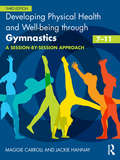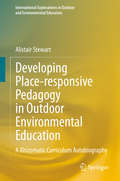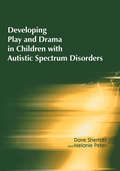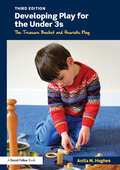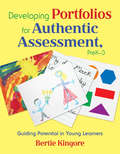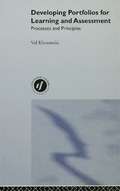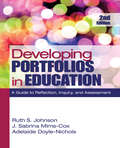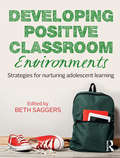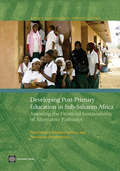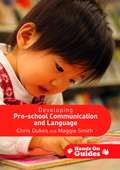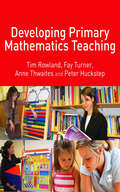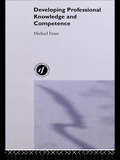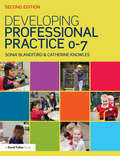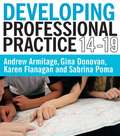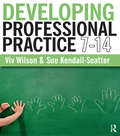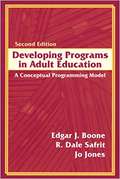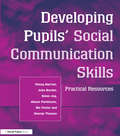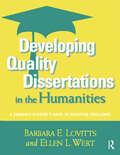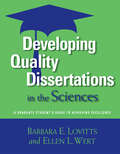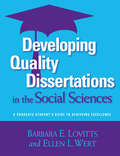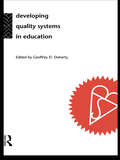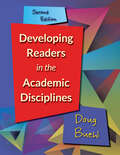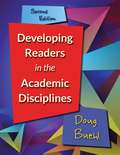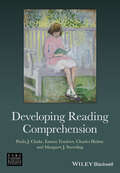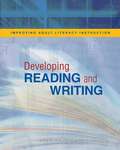- Table View
- List View
Developing Physical Health and Well-being through Gymnastics (7-11): A Session-by-Session Approach
by Maggie Carroll Jackie HannayHow can you make gymnastics challenging, lively and inclusive? How can you improve the health, fitness and well-being of all your children? How can you ensure progression over time? This practical and easy-to-use teacher’s guide is the brand new edition of the popular workbook Gymnastics 7-11. It takes a session-by-session approach to teaching physical development and well-being through gymnastics for the seven to eleven age range. Fully updated with the most current schemes of work to use at Key Stage 2, it sets out a series of forty-four sessions over the four year span, to give you planned and logical progression of both content and advice. The session plans are structured from year three to year six and can be followed as a complete course or dipped into for ideas and inspiration. Illustrated thoughout with colour photographs of real children in a range of gymnastics lessons, this one-stop resource also includes a 'Specific Skills Guide' to help you support children in developing the correct techniques. Each session plan includes: learning objectives assessment criteria consolidation from the previous session step-by-step session content warm up and final activities teaching approaches floor and apparatus work. The companion volume, Developing Health and Well-being through Gymnastic Activity (5-7) follows the same format, and together, these user-friendly books provide a continuous and progressive programme of work from years one to six. If you are a practising or student teacher, this guide will give you all the confidence you need to teach gymnastics in your school!
Developing Place-responsive Pedagogy in Outdoor Environmental Education: A Rhizomatic Curriculum Autobiography (International Explorations in Outdoor and Environmental Education)
by Alistair StewartThis book is a rhizomatic curriculum autobiography that charts the author’s efforts to develop and promote Australian outdoor environmental education practices that are inclusive of, and responsive to, the places in which they are performed. Joining philosophical concepts created by Gilles Deleuze and Felix Guattari with William Pinar’s autobiographical method for curriculum inquiry, the author (re)considers the interrelated concepts, contexts and complex conversations with colleagues, students and others that have shaped his approach to curriculum, pedagogy and research for fifteen years or more. Emphasising the complexity of developing curricula and pedagogies that engage, in a respectful and generative way, with the natural and cultural history of the Australian continent, the author explicates and enacts his attempts to think differently about the cultural, curricular and pedagogical understandings that inform the practices of Australian outdoor environmental educators. Outdoor environmental education in Australia has historically been influenced by imported universalist ideas, particularly from the USA and the UK. However, during the last two decades a growing number of researchers in this field have challenged the applicability of such taken-for-granted approaches and advocated the development of curricula and pedagogies informed by the unique bio-geographical and cultural histories of the locations in which educational experiences take place. As this book demonstrates, Alistair Stewart is prominent among the vanguard of Australian outdoor environmental educators who have led such advocacy by combining practical experience with theoretical rigour.
Developing Play and Drama in Children with Autistic Spectrum Disorders
by Dave Sherratt Melanie PeterLearning through play is a well-established principle that underpins much educational practice, yet it is often overlooked in association with children with autistic spectrum disorders. This book considers the wide-ranging benefits of developing play and taking it into drama with these children. The authors demonstrate how to implement such approaches via a highly practical, structured developmental framework, within which participants may gradually learn to be creative. They also discuss the psychology and pedagogy of autism in relation to play and drama and connect them to everyday learning situations using a wealth of examples. This accessible approach to play and drama can offer a powerful, memorable, integrating way forward for children with autistic spectrum disorders - and enjoyable, fun opportunities for teaching and learning.
Developing Play for the Under 3s: The Treasure Basket and Heuristic Play
by Anita M. HughesWe currently live in a two dimensional world of tapping and sliding fingers on screens, but babies and young children need to touch, taste, smell, shake and bang three dimensional objects in order to develop thinking and learning skills. The Treasure Basket and Heuristic play approach is all about offering natural and household objects to babies and young children to play with. This simple approach promotes extraordinary capacities of concentration, intellectual curiosity and manipulative mastery. Full of resource ideas and activities, this book offers accessible explanations of how the under 3’s think and learn, step by step guidance for setting up play sessions and descriptions of the best materials to offer. Featuring original interviews between the author and Elinor Goldschmied, who was the pioneer of the Treasure Basket and Heuristic Play, this third edition of Developing Play for the Under 3s has been thoroughly updated to include: A new chapter with case studies to show how Heuristic Play can be offered to the 2-4 year olds. A new chapter exploring the myths and misunderstandings of this approach. Links to the Forest School movement. Research evidence supported by case studies. The characteristics of effective learning and how the Treasure Basket and Heuristic Play promote these. Information about the Froebel Archive project, bringing the story of Elinor Goldschmied’s work alive through film. Based on a wealth of research into how babies learn and the principles of learning, together with the author’s own personal experience of working with the under 3s, this book will be indispensable for anyone involved in the care and development of children in this age group.
Developing Portfolios for Authentic Assessment, PreK-3: Guiding Potential in Young Learners
by Bertie KingoreWritten for early childhood educators, this guide provides rubrics, samples, reproducibles, and easy-to-understand procedures for developing fun, effective student assessment portfolios and integrating assessment and instruction.
Developing Portfolios for Learning and Assessment: Processes and Principles
by Val KlenowskiThe portfolio is a collection of work recording an individual's achievements over an extended period of time. They can be used at all stages of education and professional development and in a variety of ways, to show mastery of subject knowledge, for example, or to help the students develop reflective practice, assess their own
Developing Portfolios in Education: A Guide to Reflection, Inquiry, and Assessment
by Ruth S. Johnson J. (Joan) Mims-Cox Adelaide R. Doyle-NicholsDeveloping Portfolios in Education, Second Edition, walks teachers through the practical aspects of creating portfolios and demonstrates how they can be used as an action research tool for reflection and professional development. Authors Ruth S. Johnson, J. Sabrina Mims-Cox, and Adelaide Doyle-Nichols include checklists, visuals, organizational strategies, and hands-on tools to help readers through every step of developing a professional portfolio. Key Features Emphasizes the role of standards as they apply to portfolio content and evaluation Includes chapter-opening scenarios that offer real-world examples of portfolio development New to This Edition Presents a chapter that links portfolio development to action research Contains updated material on electronic portfolio development Provides new step-by-step descriptions of the portfolio process written specifically for teachers Accompanying Student Resources on CD provide video clips of portfolio presentations, sample electronic portfolios for elementary and secondary teaching credential candidates, PowerPoint slides, tables, templates, and links to Web sites.
Developing Positive Classroom Environments: Strategies for nurturing adolescent learning
by Beth SaggersThe middle years of learning are increasingly recognised as one of the most challenging yet opportune periods for growth and development. Based on the Positive Behaviour Support (PBS) framework, this book will equip educators with the appropriate knowledge, skills and strategies to support learners in maximising their educational success, managing emotional issues and making a successful transition to adulthood. Part A outlines the principles of the PBS framework, defines key characteristics of middle-years learners and provides insight from neuroscience into the nature of the adolescent brain. This section also looks at the importance of listening to the student voice, highlights issues that can arise during the transition into the middle years of schooling, and discusses the use of evidence-based PBS practices to encourage engagement and establish clear behavioural expectations with learners. Part B focuses on the practical aspects of implementing universal PBS strategies in the classroom, including developing strong and effective relationships with students, promoting school connectedness and supporting self-regulation. Part C examines more focused and intensive interventions, and provides strategies for working with students experiencing stress, anxiety and bullying. Finally, Part D discusses ways to support a range of perspectives and experiences in the middle-years, including trauma-affected students, ethnic and cultural diversity and students on the autism spectrum, as well as ways to use ICT to re-engage vulnerable students. This is an essential reference for both primary and secondary educators, revealing how PBS strategies can play a profound role in positively transforming classroom behaviour.
Developing Post-Primary Education in Sub-Saharan Africa
by Ramahatra Rakotomalala Alain Mingat Blandine LedouxCountries in Sub-Saharan Africa have made substantial progress in universalizing primary school completion. Many young Africans are completing primary schooling, and many more will do so in the coming years. The pressure-already strong-to expand secondary and tertiary education is expected to intensify. Finding a sustainable path for such expansion is a challenge for all countries in the region. Given the diversity across African countries, 'Developing Post-Primary Education in Sub-Saharan Africa: Assessing the Financial Sustainability of Alternative Pathways' offers no generic policy fix. Rather, it seeks to provide policy makers and their development partners with an analytical tool to inform discussion and debate about alternative options in light of country circumstances. It presents simulation scenarios that serve an illustrative function to draw attention to the implications of such options as raising the share of education in the national budget, reforming the service delivery arrangements to manage costs, diversifying the student flow beyond lower secondary education, and enlarging the role of private funding, particularly in post-primary education. The study captures the nature of the policy choices by presenting alternative packages of policies and using them to clarify the affordability of what the authors characterize as spartan and generous choices. One of the study's most valuable contributions is the flexibility of the simulation model, which can be used to adapt the package of policies to national contexts. 'Developing Post-Primary Education in Sub-Saharan Africa: Assessing the Financial Sustainability of Alternative Pathways', which contains detailed annexes with results for 33 low-income countries, will be of interest to national education policy makers and development partners, as well as education researchers and education consultants.
Developing Pre-School Communication and Language (Hands on Guides)
by Maggie Smith Chris DukesIncludes CD-Rom `This book is highly recommended for all practitioners interested in improving their practice in developing young children's communication and language. The ability to print material form the CD-Rom enables the information to be accessed by practitioners working with children of different ages in different rooms in a setting' - Early Years Update `A very clear and easy to read style of text. . . This book has a common sense approach to good practice. I thoroughly recommend this book to anyone wishing to develop this area of childminding work' - National Childminding Association `An excellent resource for all those working with young children. . . the ideas are tried and tested, user-friendly and research-based, and can be trusted and implemented with ease' - Early Years Educator `This book will be an invaluable support: a treasure-chest of superb resources, materials, ideas and suggestions for the busy early years practitioner who is keen to develop the language of the children in their care. The CD-ROM will save some of that precious time we all strive to expand, and the practical strategies offered will be a boon to practice in the setting' - Collette Drifte Looking for advice on how to develop communication and language skills in the pre-school? Packed with helpful advice on supporting and developing the crucial language and communication skills of the children in your early years setting, this book provides clear guidance on appropriate expectations for each age group between birth to five. The book includes: - advice on how to support language development in all children, including those with special educational needs - practical ideas and strategies for practitioners and parents - guidance on when to seek advice and working with other professionals - activities and case studies - a CD Rom with useful photocopiable resources. This book is ideal for all those working with the 0 to 5 age range, such as pre-school practitioners, nursery managers, advisory teachers, SENCOs, Inclusion Officers and Child Care and Education students and tutors. Chris Dukes and Maggie Smith are both Area SENCOs who work closely with pre-school SENCOs and Managers on a daily basis.
Developing Primary Mathematics Teaching: Reflecting on Practice with the Knowledge Quartet
by Fay Turner Tim Rowland E Anne Thwaites Peter HuckstepHow can KS1/2 teachers improve their mathematics teaching? This book helps readers to become better, more confident teachers of mathematics by enabling them to focus critically on what they know and what they do in the classroom. Building on their close observation of primary mathematics classrooms, the authors provide those starting out in the teaching profession with a four-stage framework which acts as a tool of support for developing their teaching: - making sense of foundation knowledge - focusing on what teachers know about mathematics - transforming knowledge - representing mathematics to learners through examples, analogies, illustrations and demonstrations - connection - helping learners to make sense of mathematics through understanding how ideas and concepts are linked to each other - contingency - what to do when the unexpected happens Each chapter includes practical activities, lesson descriptions and extracts of classroom transcripts to help teachers reflect on effective practice.
Developing Professional Knowledge And Competence
by Michael ErautThis volume analyzes different types of knowledge and know-how used by practising professionals in their work and how these different kinds of knowledge are acquired by a combination of learning from books, learning from people and learning from personal experience.; Drawing on various examples, problems addressed include the way theory changes and is personalized in practice, and how individuals form generalizations out of their practice. Eraut considers the meaning of client-centredness and its implications, and to what extent professional knowledge is based on intuition, understanding and learning. He considers the issue of competence versus knowledge and the effect of lifelong learning on the quality of practice.
Developing Professional Practice 0-7
by Sonia Blandford Catherine KnowlesDeveloping Professional Practice 0-7 provides a thoroughly comprehensive and cutting edge guide to developing the understanding and practical skills necessary for working within early years education. The new edition is fully updated for the revised Early Years Foundation Stage Statutory Framework. The updated edition covers all core topics associated with developing effective professional practice, including leadership and management, personalised learning and continuing professional development. There is also a strong focus on parent/carer engagement, setting accountability for the lowest attaining groups, the parent/carer and child voice in education, transition, SEND reform, early intervention, and developing leadership at all levels including as a business model. Readers can explore in-depth issues, and take ownership of them, by applying theory to real practice in schools and early years settings. Chapter contents are directly linked to the Early Years Teacher Standards, providing a clear understanding of how the content relates to competencies and allowing readers to reflect critically on best practice. Discussion points and case studies further connect theory to practice and offer a genuinely accessible and engaging introduction to supporting the education of babies, toddlers and young children.? This vibrant, dynamic and interactive approach uses examples of real practice, along with a range of additional features tailored to support the reader in developing their knowledge, skills and understanding. Developing Professional Practice 0-7 is essential reading for anyone training to work in the early years, and an invaluable resource for all those already in the early stages of their careers.
Developing Professional Practice 14-19
by Andy Armitage Gina Donovan Karen Flanagan Sabrina PomaThe Developing Professional Practice series provides a thoroughly comprehensive and cutting edge guide to developing the necessary knowledge, skills and understanding for teaching within the 0-7, 7-14 or 14-19 age ranges. Each of the three titles offers a genuinely accessible and engaging introduction to a wide range of professional practice supporting the education of babies to young adults. Discussion of current developments in theory, policy and research is combined with guidance on the practicalities of working with each age group. Numerous examples of real practice are included throughout, along with a range of additional features to help promote understanding.
Developing Professional Practice 7-14
by Viv Wilson Sue Kendall-SeatterDeveloping Professional Practice 7-14 provides a thoroughly comprehensive and cutting edge guide to developing the necessary knowledge, skills and understanding for teaching within the 7-14 age range. This book is designed to guide you through your initial teacher training programme, and on into the early stages of your career, with the aim of stimulating and supporting you in the process of developing your practice.A range of pedagogical features are provided in each chapter to encourage reflection, interaction and debate. Over to you features pose questions that will encourage you to examine your own knowledge, understanding and practical skills. Working in the Classroom features will help you to envisage how the material covered might impact on your classroom practiceCase studies offer extended examples that help illustrate core concepts and theories in action. Controversy features provide in-depth discussion of issues that are ongoing causes for debateResearch briefing boxes explore recent research studies, and explain their bearing on day to day practiceAdditional resources and support are provided via the Developing Professional Practice companion website, www.pearsoned.co.uk/7-14, where you can access additional self-study questions, case studies, interactive chapter-by-chapter tutorials, interviews with practitioners and students, and a glossary of key terms. Developing Professional Practice 7-14 is essential reading for anyone training to teach in primary or secondary schools, as well as those specialising in the middle years specifically. It will also prove an invaluable resource for all those already in the early stages of their careers.
Developing Programs in Adult Education: A Conceptual Programming Model
by Jo Jones; R. Dale Safrit; Edgar J. BooneThe Second Edition of Developing Programs in Adult Education will serve as an indispensable guide for current and prospective adult educators in planning, designing/implementing, and evaluating/accounting for adult education programs. Like the successful First Edition, this revised and expanded volume presents a conceptual programming model that draws from many concepts, constructs, and theories generated by adult educators and other scholars in closely allied disciplines. The updated model, field tested and validated, enhances and elaborates on the complex contextual relationships and processual actions represented in the original. The authors offer illustrative applications within varied organizational contexts and provide a panorama of both macro- and micro-perspectives and actions of a program planning process, with examples from various fields of adult education practice. This innovative text is the definitive authority on one of the few theoretical models of the programming process based in systems theory merged with the practice ecology of adult education.
Developing Pupils Social Communication Skills: Practical Resources
by George Thomas Penny Barratt Julie Border Helen Joy Alison Parkinson Mo PotterLearning to communicate with other people is perhaps the most important learning children do. Children with social communication problems may have trouble picking up the crucial skills of interacting and communicating with their peers, which can have more serious implications later on in life. This resource will help teachers, teaching assistants and therapists to develop and improve the social skills of their younger pupils; provides sets of easily accessible, verbal and non-verbal games and activities to encourage social interaction; provides a clear rationale to the games to help the teacher or teaching assistant really get to grips with how and why these activities can help; provides a structured approach to pupils' social development for pupils in their early and primary years which has been tried, tested and proved to be effective; and includes assessment forms and monthly and daily planning sheets
Developing Quality Dissertations in the Humanities: A Graduate Student's Guide to Achieving Excellence
by Barbara E. Lovitts Ellen L. WertThis is one of three short booklets designed to be given to graduate students as they begin their studies. These booklets explain the purposes of the dissertation and the criteria by which it will be assessed. They help students understand the context of their course work; the need to take an active role in shaping their studies; and the importance of thinking ahead about the components of the dissertation and the quality of scholarship they will need to demonstrate.These booklets are intended to support the dissertation research and writing process by providing faculty and advisors with guidelines for setting clear expectations for student performance, and with a model for helping students produce the desired quality of work. They encourage dialogue between faculty and students about the quality of the components of their dissertation project. They include rubrics that students can use to self-assess their work and that can aid faculty in providing focused feedback.Setting explicit targets and benchmarks of excellence of the sort advocated in these booklets will enable departments and universities to respond to demands for accountability with clear criteria for, and evidence of, success; and will raise the overall quality of student performance.
Developing Quality Dissertations in the Sciences: A Graduate Student's Guide to Achieving Excellence
by Barbara E. Lovitts Ellen L. WertThis is one of three short booklets designed to be given to graduate students as they begin their studies. They explain the purposes of the dissertation and the criteria by which it will be assessed. They help students understand the context of their course work; the need to take an active role in shaping their studies; and the importance of thinking ahead about the components of the dissertation and the quality of scholarship they will need to demonstrate.These booklets are intended to support the dissertation research and writing process by providing faculty and advisors with guidelines for setting clear expectations for student performance, and with a model for helping students produce the desired quality of work. They encourage dialogue between faculty and students about the quality of the components of their dissertation project. They include rubrics that students can use to self-assess their work and that can aid faculty in providing focused feedback.Setting explicit targets and benchmarks of excellence of the sort advocated in these booklets will enable departments and universities to respond to demands for accountability with clear criteria for, and evidence of, success; and will raise the overall quality of student performance.
Developing Quality Dissertations in the Social Sciences: A Graduate Student's Guide to Achieving Excellence
by Barbara E. Lovitts Ellen L. WertThis is one of three short booklets designed to be given to graduate students as they begin their studies. They explain the purposes of the dissertation and the criteria by which it will be assessed. They help students understand the context of their course work; the need to take an active role in shaping their studies; and the importance of thinking ahead about the components of the dissertation and the quality of scholarship they will need to demonstrate.These booklets are intended to support the dissertation research and writing process by providing faculty and advisors with guidelines for setting clear expectations for student performance, and with a model for helping students produce the desired quality of work. They encourage dialogue between faculty and students about the quality of the components of their dissertation project. They include rubrics that students can use to self-assess their work and that can aid faculty in providing focused feedback.Setting explicit targets and benchmarks of excellence of the sort advocated in these booklets will enable departments and universities to respond to demands for accountability with clear criteria for, and evidence of, success; and will raise the overall quality of student performance.
Developing Quality Systems in Education
by Geoffrey D. DohertyEducational institutions have not escaped the influence of the quality movement, and the FE sector in particular is now being actively encouraged to introduce the BSI's quality assurance standard BS5750. Universities and schools are also attracted by a standard which should improve, if not quality itself, then the management of quality. This book presents an overview of the pitfalls and problems of implementing quality standards in education. It explores theoretical issues, such as the relationship between the customer and academic culture. It also has a strong practical theme, looking at the advantages and disadvantages of quality systems, case studies of attempts at implementation and proposals for future developments across the education sector as a whole.
Developing Readers in the Academic Disciplines
by Doug BuehlBeing literate in an academic discipline is more than being able to read and comprehend text; you can think, speak, and write as a historian, scientist, mathematician, or artist. Author Doug Buehl strips away the one-size-fits-all approach to content area literacy and presents an instructional model for disciplinary literacy, which honors the discipline and helps students learn within that area. In this revised second edition, Developing Readers in the Academic Disciplines shows how to help students adjust their thinking to comprehend a range of complex texts that fall outside their reading comfort zones. Inside you'll find: Instructional tools that adapt generic literacy practices to discipline-specific variationsStrategies for frontloading instruction to activate and build background knowledgeNew approaches for encouraging inquiry around disciplinary textsIn-depth exploration of the role of argumentation in informational textNumerous examples from science, mathematics, history and social studies, English/language arts, and related arts to show you what vibrant learning looks like in various classroom settings Designed to be a natural companion to Buehl's Classroom Strategies for Interactive Learning, Developing Readers in the Academic Disciplines introduces teachers from all disciplines to new kinds of thinking and, ultimately, teaching that helps students achieve new levels of understanding.
Developing Readers in the Academic Disciplines (2nd Edition)
by Doug Buehl<p>Being literate in an academic discipline means more than simply being able to read and comprehend text; it means you can think, speak, and write as a historian, scientist, mathematician, or artist. Doug Buehl strips away the one-size-fits-all approach to content area literacy and presents a much-needed instructional model for disciplinary literacy, showing how to mentor middle and high school learners to become "academic insiders" who are college and career ready. <p>This thoroughly revised second edition of Developing Readers in the Academic Disciplines shows how to help students adjust their thinking to comprehend a range of complex texts that fall outside their reading comfort zones. This book --a natural companion to Buehl's Classroom Strategies for Interactive Learning, which has been bolstering student comprehension for almost three decades--provides the following supports for teachers: <p> <li>Instructional tools that adapt generic literacy practices to discipline-specific variations <li>Strategies for frontloading instruction to activate and build background knowledge <li>New approaches for encouraging inquiry around disciplinary texts <li>In-depth exploration of the role of argumentation in informational text <li>Numerous examples from science, mathematics, history and social studies, English/language arts, and related arts to show you what vibrant learning looks like in various classroom settings</li> <p> <p>Developing Readers in the Academic Disciplines introduces teachers from all disciplines to new kinds of thinking and, ultimately, teaching that helps students achieve new levels of understanding.
Developing Reading Comprehension
by Charles Hulme Emma Truelove Margaret J. Snowling Paula J. ClarkePresents cutting-edge, evidence-based interventions for dealing with specific difficulties of reading comprehension in children aged 7-11. An in-depth introduction to the ‘poor comprehender profile’, which describes children who despite being fluent readers have difficulty extracting meaning from text. Sets out a range of practical interventions for improving reading skills in this group - along with comprehensive guidance on assessment and monitoring, and insightful accounts of professionals’ experience in delivering the techniques described. Includes an overview of psychological theories of reading comprehension, evaluating their practical applicability.
Developing Reading and Writing
by M. ChiangMore than an estimated 90 million adults in the United States lack the literacy skills needed for fully productive and secure lives. The effects of this shortfall are many: Adults with low literacy have lower rates of participation in the labor force and lower earnings when they do have jobs, for example. They are less able to understand and use health information. And they are less likely to read to their children, which may slow their children's own literacy development. At the request of the U. S. Department of Education, the National Research Council convened a committee of experts from many disciplines to synthesize research on literacy and learning in order to improve instruction for those served in adult education in the U. S. The committee's report, Improving Adult Literacy Instruction: Options for Practice and Research, recommends a program of research and innovation to gain a better understanding of adult literacy learners, improve instruction, and create the supports adults need for learning and achievement. Improving Adult Literacy Instruction: Developing Reading and Writing, which is based on the report, presents an overview of what is known about how literacy develops the component skills of reading and writing, and the practices that are effective for developing them. It also describes principles of reading and writing instruction that can guide those who design and administer programs or courses to improve adult literacy skills. Although this is not intended as a "how to" manual for instructors, teachers may also find the information presented here to be helpful as they plan and deliver instruction.
